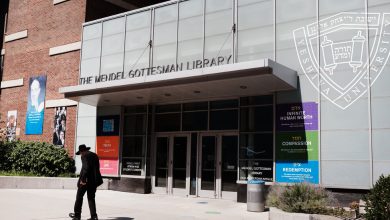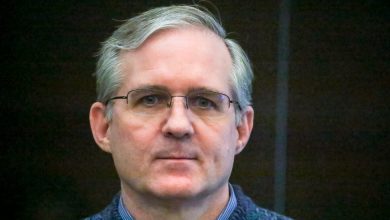Connie Hogarth, Relentless Social Activist, Dies at 95

Connie Hogarth, a relentless activist who for nearly a quarter-century led a social justice organization in suburban New York that orchestrated protests against nuclear power and worked on behalf of causes like women’s rights and the environment, died on Feb. 11 at her home in Beacon, N.Y., in Dutchess County. She was 95.
Her son Ross Hogarth confirmed the death.
“To obey one’s conscience — to do what one believes to be right — is, I believe, a primary obligation and should supersede the obligation to obey the law,” Ms. Hogarth wrote in an op-ed essay in The New York Times in 1977.
By then, the progressive group that Ms. Hogarth was running, the Westchester People’s Action Coalition, or Wespac, was four years old, having established itself as a vehicle for social action through protests, lobbying, pushing for minority jobs on construction sites, and sending public speakers to schools to raise alarms about issues like climate change.
Nuclear power, in particular, engaged (and enraged) her. She was one of more than 1,000 protesters arrested at a rally in 1977 on the site that became the Seabrook Nuclear Power Plant in New Hampshire. In 1979, she and more than 200 others were arrested for trespassing at the Indian Point nuclear power plant in Buchanan, a village in Westchester County. She spent 12 days in jail.
At her trial, she wanted to use a defense based on a state statute called “competing harms,” which allows criminal conduct when it is necessary to avoid imminent injury; she cited the potential impact of a nuclear accident on the lives of New Yorkers. (One had occurred several months earlier at Three Mile Island in Pennsylvania.)
But the judge disallowed the defense, and she was found guilty.
“Having gone through this is not a deterrent from going back to Indian Point again next year and every year until that plant is closed down,” Ms. Hogarth said after the trial.
She lived to see Indian Point shut down last year.
Ms. Hogarth could be fiery in expressing her outrage, but she trained volunteers in nonviolent civil disobedience.
“The thing that she was very insistent on, in lots of training and preparation for these actions, is that the police or even hostile passers-by are not our adversaries,” Charlie Scheiner, who founded Wespac with Ms. Hogarth, said in an interview. “They’re human beings and can be talked or even reasoned with.”
She and Pete Seeger, the folk singer and a neighbor of Ms. Hogarth’s in Beacon, protested weekly during the Iraq War with other peace protesters at a busy intersection along Route 9 near a shopping mall in Poughkeepsie, N.Y., encouraging motorists with their signs to honk if they opposed the war.
“Connie’s an indefatigable organizer,” Mr. Seeger told the University of Chicago Magazine in 2006. “If it doesn’t work in one way, she’ll organize it in a different way.”
Constance Holubar was born on Nov. 19, 1926, in Brooklyn to Stanley and Rose (Mandel) Holubar. Her father accompanied silent movies on piano and organ before becoming a film projectionist. Her mother was a nurse.
She was age 7 or 8 when she was introduced to activism by her father, joining him on picket lines during strikes by the projectionists’ union. Her mother was “an early feminist” who “made her presence and opinions felt,” she told The Times in 1996.
Hoping to be a doctor, Ms. Hogarth was a pre-med and dance student on a scholarship at the University of Chicago. But after earning bachelor’s degrees in 1947 and 1948, she could not get into medical school and instead became a medical researcher, With her husband, Robert Green, a doctor, she moved to Manhattan, where she worked at Mount Sinai Hospital on a drug to treat multiple myeloma. She later worked for a doctor whose refusal to cooperate with the House Committee on Un-American Activities led to his imprisonment in 1950.
Ms. Hogarth’s exhilarating introduction to dissent on a national stage occurred in 1951, when she marched around the White House to protest the trial of Julius and Ethel Rosenberg, who were accused of passing atomic secrets to the Soviet Union.
Her marriage to Dr. Green was brief and, in 1953, she married Burne Hogarth, the artist who had drawn the Tarzan comic strip from 1937 to 1950 and was a founder of what is now the School of Visual Arts in Manhattan.
In addition to her son Ross, she is survived by another son, Richard, both from her marriage to Mr. Hogarth, and a grandson. She and Mr. Hogarth divorced in 1981. In 1990, she married Art Kamell, a lawyer, who died in 2010.
Her activism began in earnest during the Vietnam War, with her participation in groups like the Women’s International League for Peace and Freedom and Women’s Strike for Peace. She was arrested for the first of more than 20 times during a demonstration in Washington — a “die-in” — in which protesters laid down in front of the White House to represent the Vietnamese who were dying each day.
As the war was winding down in 1973, she and Mr. Scheiner formally started Wespac, which has embraced many causes, including ending apartheid in South Africa. Working with two Westchester County legislators, Wespac helped persuade the county to stop investing in banks that did business with South Africa.
Ms. Hogarth was called “The Conscience of White Plains” by The Daily News in 1979 and, in 1983, the “pre-eminent dissenter in Westchester,” by Suburbia Today, the Sunday supplement of Gannett’s Westchester Rockland Newspapers.
“Every issue that needed a home, that needed a place to hold meetings, happened at Wespac,” said Al Giordano, who joined the organization in the 1970s as a teenager. “When the small Black community in Westchester was organizing against landlords, or against police brutality, Connie opened the door to them.”
She retired as Wespac’s executive director in 1996 after 23 years. Two years later, the Connie Hogarth Center for Social Action opened at Manhattanville College in Purchase, N.Y., where she helped teach students become effective social activists. She was also involved with the organizations Climate Crisis Coalition, the New York Civil Liberties Union and the environmental group Hudson River Sloop Clearwater, as well as local Democratic politics.
Nada Khader, the executive director of Wespac (now the Wespac Foundation) for the past 21 years, said in a phone interview that Ms. Hogarth had remained an important adviser to the organization, adding, “She showed me how to be a more impactful organizer for progressive social change while exuding a gentle, soft spirit.”





